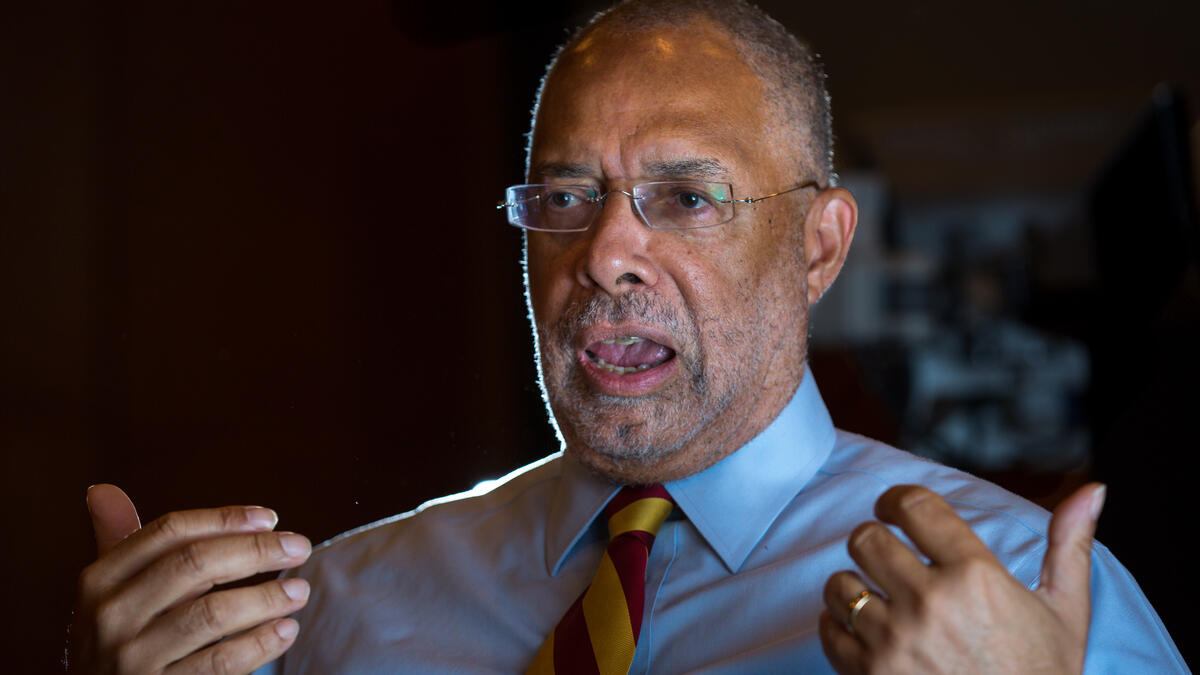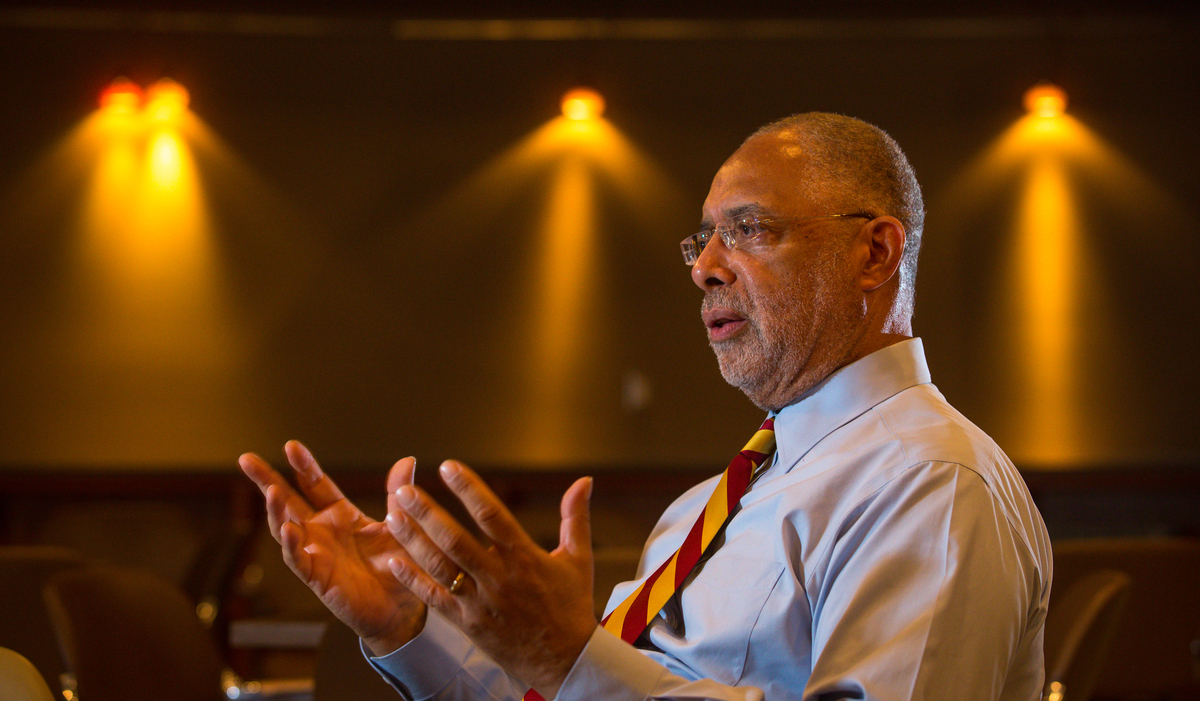With all due respect to the people who guide us through the legal system, everybody knows a good lawyer joke.
Like this one: Santa Claus, the Tooth Fairy, an honest lawyer and an old drunk were walking along when they simultaneously spotted a hundred-dollar bill in the street. Who gets it? The old drunk, of course — the other three are mythological creatures.
Or, why won’t sharks attack lawyers? Professional courtesy.
All fun aside, Myles Lynk isn’t the type of lawyer who would be the butt of any of these jokes.
The professor in ASU's Sandra Day O'Connor College of Law has been tapped by the likes of the White House and the Chief Justice of the United States for his objective legal mind, as well as his sense of fairness.
“I took to heart the words of Charles Hamilton Houston, Howard University’s most famous dean, who once said, ‘Lawyers should be social engineers for justice,’ ” Lynk said.
He hasn’t forgotten the message. Earlier this year, Lynk was one of several lawyers who worked with the NAACP Legal Defense and Educational Fund and the American Bar AssociationStephen A. Salzberg, a law professor at George Washington University, was the main driver behind this appointment. to craft a statement that addressed the issue of race and inequality in the justice system. It was a response driven by the real and perceived evidence of racial bias among some representatives of that system.
Lynk grew up in a time and place when civil rights were fluid and evolving, which he said is what made him the person he is today.
“I was born in the Bronx, and I tell my kids that I grew up on ‘Sesame Street’ because it was such a wonderfully diverse community. I have great affection for everyone I knew — the butcher, the baker, the barber, the grocery man, the police officers and the firemen. It was a diverse community and there was not the kind of friction you often associate with that today.”
The friction came later in 1969 when Lynk became a VISTA volunteerThis was a precursor to the AmeriCorps VISTA organization., working and living in St. Louis’ notorious Pruitt-Igoe public housing project — known for its poverty, crime and segregation. It was there where he got his first taste of discrimination as well as a jaundiced eye from both sides of the law.
“I lived there with a white fellow, Jim, whom I still consider a brother. So it was this white guy and black guy living together in the projects,” Lynk said with a laugh. “The hardheads on the block called us ‘The Mod Squad’ because they all thought we were undercover cops. And the police thought we were narcotics dealers because who else would live there like that? We had to tell each group, ‘No, we’re not who you think we are. We’re just volunteers.’ ”
"Racism, whether unconscious or not, is a difficult reality we need to face. Until the day comes when racism no longer exists, we cannot pretend it does not exist."
— ASU law professor Myles Lynk
Lynk and his partner proved themselves over time fighting for the residents of the community, who were forced to move when St. Louis decided to raze the housing project. Lynk forced the city to relocate all of its previous residents.
“The city felt it was good enough to tell them that they had to be out by a certain date, but the problem was other housing developments didn’t want anyone from Pruitt-Igoe,” Lynk said. “We told them, ‘You just can’t put the burden on these residents to find housing when you brought them here in the first place.’ ”
The Pruitt-Igoe project was eventually imploded on television in 1972. Lynk was gone by that time, moving on to another project that took him to another part of the world.
After the completion of his VISTA service, Lynk served as co-director of the Harvard Africa Volunteer Project in Cambridge, Massachusetts, and Nairobi, Kenya, while obtaining his undergraduate degree at Harvard. After he graduated cum laude, Lynk traveled to Ngora, Uganda, where he worked as a community health research officer at a rural hospital working on health education, child nutrition and disease prevention projects. The hospital was run by British Anglicans while President Idi Amin, known for human-rights abuses, ethnic persecution and mass killings, was in control of the country.
“I came to deeply respect and appreciate the Anglicans’ faith and respect to service,” Lynk said. “The same respect applied to Africans in Africa. To be there, work there, be a part of a community for a year was an incredible opportunity. It expanded my horizons.”
While volunteer opportunities nourished Lynk’s soul, he eventually came to the realization that he could help more people as an attorney. In September 1973 he returned to Cambridge and enrolled at Harvard Law School, where he received his Juris Doctor degree three years later.
“You make certain decisions in your life and I thought this was something I could do,” Lynk said. “What are your gifts? What are your skills? I’m glad I chose that route.”
And so was the Carter administration, who appointed Lynk as a special assistant to the Secretary of Health, Education and Welfare in the late 1970s. Later, the White House, appointed Lynk to its domestic-policy staff as assistant director for the Transportation and Maritime Policy.
However, Lynk spent the majority of his career (1983-1999) in private practice at Dewey Ballantine LLP in Washington, D.C., where he served on the legal staff of the Special Counsel to the Committee on Standards of Official Conduct of the U.S. House of Representatives, investigating allegations of improper conduct involving congressmen, staff and teenagers serving as House pages. He also advised companies on governance and regulatory issues, litigated in federal and local courts and worked with area attorneys to give pro bono work to low-income clients.
“I think all of us who grew up in the 1960s, white or black, were influenced by the civil-rights movement,” Lynk said. “One of the things I tell my students is that lawyers have a special responsibility for the quality of justice. This special responsibility means that, among other duties, lawyers should also be mindful of deficiencies in the administration of justice.”
Discovering that he had a natural gift for teaching, Lynk began spreading his academic wings as a visiting professor of law at George Washington University Law School and a lecturer in law at the University of Maryland Law School. In 2000 he was invited to ASU as a visiting professor but was offered tenure and is now the Peter Kiewit Foundation Professor of Land and the Legal Profession.
The university immediately recognized that Lynk could be effective beyond the classroom, and appointed him in 2004 to serve as the faculty athletics representative to ASU’s athletic department. He also chaired the then Pac-10 Conference’s Diversity Leadership Initiative Committee for new policy to include ethnic minorities and females in searches to hire coaches and administrators and approved annual funding for participation in the NCAA Leadership Development Institute for professional development of current ethnic-minority males and of female athletic administrators.
ASU Law professor Myles Lynk sees his job as a social engineer for change and has spent a majority of his legal career fighting for the underrepresented and oppressed in low-income areas. Photos by Charlie Leight/ASU Now
Lynk’s reputation as a community builder who could keep a cool head is part of the reason he was recruited by the American Bar Association and the NAACP Legal Defense and Educational Fund to help leaders draft a statement regarding the crisis of confidence about the integrity of the criminal justice system over a string of shootings — like Walter Scott in South Carolina, 12-year-old Tamir Rice in Ohio, Eric Garner in New York and Freddie Gray in Baltimore, which were captured by citizen video and viewed nationwide.
“I don’t believe police departments are more racist today than they were in the past. There are many more black commanders and police officers with much more training,” Lynk said. “However, the impact of the bad apples can be far greater today because it’s immediately disseminated nationally and internationally, and it resonates. It’s an issue that needs to be addressed in a responsible way.”
And part of the responsibility, Lynk said, extends to the black community. He believes community leaders need to work with young black men to help them better understand how they are perceived by others.
“Racism, whether unconscious or not, is a difficult reality we need to face,” Lynk said. “Until the day comes when racism no longer exists, we cannot pretend it does not exist.”
Lynk believes America today has made a lot of strides since the civil-rights movement, but there’s still so much more to do.
“A lot of (barriers) have been removed since the 1960s, and America today is much more diverse,” Lynk said. “In a sense we won, but one of the things we’ve had to realize is that there are no final victories. Frederick Douglass once said, ‘Nothing is given to you. You have to work for it and reenergize.’ New generations need to be reminded of the struggles of the past and we need to build on those victories, but always be building.”
More Law, journalism and politics
Can elections results be counted quickly yet reliably?
Election results that are released as quickly as the public demands but are reliable enough to earn wide acceptance may not always be possible.At least that's what a bipartisan panel of elections…
Spring break trip to Hawaiʻi provides insight into Indigenous law
A group of Arizona State University law students spent a week in Hawaiʻi for spring break. And while they did take in some of the sites, sounds and tastes of the tropical destination, the trip…

LA journalists and officials gather to connect and salute fire coverage
Recognition of Los Angeles-area media coverage of the region’s January wildfires was the primary message as hundreds gathered at ASU California Center Broadway for an annual convening of journalists…



